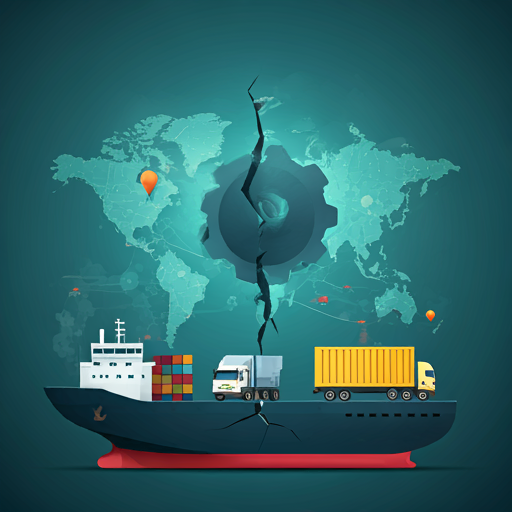Introduction to Global Supply Chain Disruptions
Overview of Supply Chain Dynamics
Global supply chains are intricate networks that involve the production and distribution of goods across various regions. Disruptions in these systems can arise from geopolitical tensions, natural disasters, or pandemics. Such events can lead to significant delays and increased costs. He must consider the ripple effects on stock-take management and customer satisfaction. Supply chain resilience becomes crucial in mitigating these impacts. Companies often reassess their sourcing strategies to enhance flexibility. This shift can lead to a more localized supply chain model. Is this the future of global trade? Understanding these dynamics is essential for financial professionals navigating market volatility.
Recent Events Impacting Supply Chains
Recent geopolitical tensions have significantly disrupted global supply chains. Trade restrictions and tariffs have altered established routes. This has led to increased operational costs for many businesses. He must evaluate the impact on profit margins. Additionally, the COVID-19 pandemic has exposed vulnerabilities in logistics networks. Many companies faced shortages of critical components. This situation has prompted a reevaluation of inventory strategies. Is just-in-time inventory still viable? Understanding these challenges is essential for strategic planning.
Impact on Businesses
Short-term Effects on Operations
Short-term disruptions in supply chains can lead to several immediate operational challenges for businesses. These include:
Such issues can strain cash flow and reduce profitability. He must monitor these financial impacts closely. Additionally, customer dissatisfaction may arise from delayed orders. This can damage brand reputation and customer loyalty. Companies often need to implement contingency plans quickly. Is flexibility the key to survival? Adapting to these challenges is crucial for maintaining competitive advantage.
Long-term Strategic Changes
Long-term strategic changes in response to supply chain disruptions can reshape business operations significantly. Companies may diversify their supplier base to mitigate risks. This approach enhances resilience against future shocks. He must consider the financial implications of such strategies. Additionally, investing in technology for better supply chain visibility becomes essential. Improved data analytics can lead to more informed decision-making. Is technology the future of supply chains? Businesses may also adopt sustainable practices to align with consumer expectations. This shift can enhance brand loyalty and market positioning.
The Role of Cryptocurrency in Supply Chains
Enhancing Transparency and Traceability
Cryptocurrency can significantly enhance transparency and traceability in supply chains. By utilizing blockchain technology, businesses can create immutable records of transactions. This ensures that every step in the supply chain is documented. He must recognize the importance of real-time data access. Additionally, smart contracts can automate compliance and payment processes. This reduces the risk of fraud and errors. Is this the future of secure transactions? Enhanced traceability can also improve consumer trust in product origins. Companies may find this beneficial for brand reputation.
Facilitating Cross-Border Transactions
Cryptocurrency plays a pivotal role in facilitating cross-border transactions within supply chains. By enabling instant payments, it reduces the time and costs associated with traditional banking systems. He must consider the implications for cash flow management. Additionally, cryptocurrencies can mitigate currency exchange risks, providing stability in volatile markets. This is particularly beneficial for international suppliers. Furthermore, blockchain technology ensures secure and transparent transactions. Is security a priority for your business? Enhanced traceability can also streamline customs processes, reducing delays. Companies may find this advantageous for operational efficiency.
Case Studies: Businesses Adapting to Disruptions
Success Stories in the Cryptocurrency Space
Several businesses have successfully adapted to disruptions using cryptocurrency. For instance, a logistics company implemented blockchain to enhance tracking. This improved transparency and reduced fraud risks. He must evaluate the financial benefits of such innovations. Another example includes a retailer accepting cryptocurrency for international sales. This streamlined payment processes and reduced transaction fees. Is this a viable option for your business? Additionally, a food supplier utilized smart contracts to automate payments. This minimized delays and improved cash flow. Companies are finding these solutions increasingly effective.
Lessons Learned from Traditional Industries
Traditional industries have provided valuable lessons for businesses adapting to disruptions. For example, the automotive sector has embraced just-in-time inventory systems. This approach minimizes excess stock and reduces holding costs. He must assess the impact on operational efficiency. Additionally, the food industry has prioritized supply chain transparency. This builds consumer trust and ensures product safety. Is transparency essential for your brand? Furthermore, companies in manufacturing have adopted flexible production techniques. This allows for quick adjustments to changing market demands. These strategies can enhance resilience in uncertain environments.
Future Outlook: Supply Chains and Cryptocurrency
Emerging Trends in Supply Chain Management
Emerging trends in supply chain management indicate a growing integration of cryptocurrency. This shift enhances transaction efficiency and reduces costs. He must consider the implications for cash flow. Additionally, blockchain technology is being adopted for improved traceability. This ensures product authenticity and safety. Is safety a priority for consumers? Furthermore, companies are exploring decentralized finance (DeFi) solutions. These can streamline financing options for suppliers. Adopting these innovations may provide a competitive edge. Businesses should stay informed about these developments.
Potential Challenges and Opportunities
The integration of cryptocurrency into supply chains presents both challenges and opportunities. Regulatory compliance remains a significant concern for businesses. He must navigate complex legal frameworks. Additionally, volatility in cryptocurrency values can impact financial planning. This uncertainty requires careful risk management strategies. On the other hand, adopting cryptocurrency can enhance transaction speed. This leads to improved cash flow management. Is speed essential for your operations? Furthermore, blockchain technology offers increased transparency. This can build consumer trust and loyalty. Companies should weigh these factors carefully.

Leave a Reply